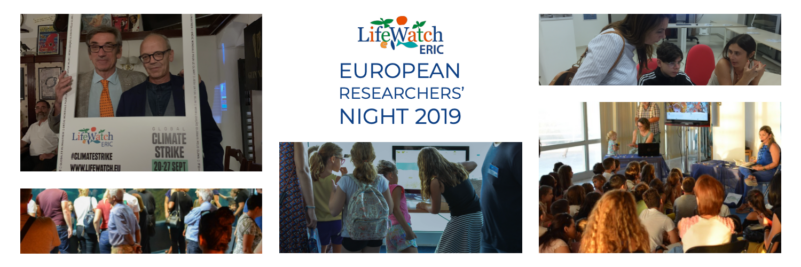
September is a busy month in the LifeWatch ERIC calendar, not only for the many scientific congresses, but also because of the increased outreach to the general public, students and families in particular, to interest them in the science behind biodiversity and ecosystem research. Within the framework of the European Researchers’ Night, on 27 September 2019, events were staged in member countries to highlight the impact of research on our daily lives.
As a record 7.6 million people took to the streets in Climate Strike protests around the world, universities, laboratories and museums across Europe were opening their doors to promote how scientific researchers contribute to society by displaying their work in interactive and engaging ways, with the ultimate aim of motivating young people to embark on research careers of their own.
The LifeWatch Greece team participated in a European Researchers’ Night in the Hellenic Centre for Marine Research, Heraklion. Hundreds of people attended and had the opportunity to learn about marine research and aquatic biodiversity in different thematic pavilions and hands-on activities, including Virtual Reality, interactive games and demonstrations.
In Lecce, Italy, professors Alberto Basset (LifeWatch ERIC) and Giuseppe Corriero (LifeWatch Italy) joined “A Pint with Science”, an open event in a popular bar, talking about ‘Biodiversity Emergency, Objective Sustainability’ to a responsive crowd of followers on Thursday.
The following day, LifeWatch ERIC Service Centre at the University of Salento opened its premises to young people and families, to play dedicated serious games on biodiversity and make enquiries about the infrastructure and its activities. Listening to videos of key scientists explaining how ecological science builds an understanding of the issues we face globally, visitors were guided to learn more about the key challenges ahead in the field of biodiversity and ecosystem research
In the midst of popular calls to deal with current climate issues, these outreach events showcase the diversity of research, bring researchers closer to the public, mobilise citizens, and increase general awareness and understanding of how important research and innovation are in addressing societal challenges.